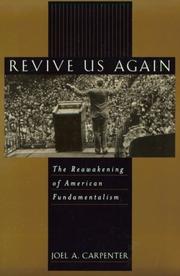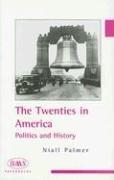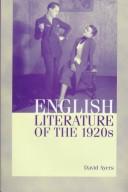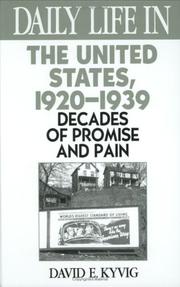| Listing 1 - 10 of 64 | << page >> |
Sort by
|
Book
ISBN: 9782877307413 Year: 2004 Publisher: Arles P. Picquier
Abstract | Keywords | Export | Availability | Bookmark
 Loading...
Loading...Choose an application
- Reference Manager
- EndNote
- RefWorks (Direct export to RefWorks)
Popular culture --- Japan --- Civilization --- Socio-Cultural History --- 1920s
Book
Publisher: Tilburg : Het nederlandsche boekhuis,
Abstract | Keywords | Export | Availability | Bookmark
 Loading...
Loading...Choose an application
- Reference Manager
- EndNote
- RefWorks (Direct export to RefWorks)

ISBN: 0195129075 Year: 1999 Publisher: Oxford Oxford University Press, Inc.
Abstract | Keywords | Export | Availability | Bookmark
 Loading...
Loading...Choose an application
- Reference Manager
- EndNote
- RefWorks (Direct export to RefWorks)
American fundamentalism --- Scopes monkey trial --- 1920s --- 1940s --- 1950s --- evangelists --- Billy Graham --- fundamentalist movements --- religious history --- cultural history

ISBN: 1280501545 9786610501540 0748626719 9780748626717 6610501548 9781280501548 0748620370 9780748620371 Year: 2006 Publisher: Edinburgh Edinburgh University Press
Abstract | Keywords | Export | Availability | Bookmark
 Loading...
Loading...Choose an application
- Reference Manager
- EndNote
- RefWorks (Direct export to RefWorks)
Offering an account of the politics and history of the 1920's in America, this book points out key distinctions between the governing styles and political philosophies of Warren Harding and Calvin Coolidge. It argues that social and technological change resulted in lines of conflict over poverty, race, religion, and employment rights being redrawn.
Nineteen twenties. --- 1920s --- 20s (Twentieth century decade) --- Jazz Age --- Roaring twenties --- Twenties (Twentieth century decade) --- Twentieth century --- United States --- History --- Politics and government

ISBN: 1474400507 0585159270 9780585159270 9781474400503 0748609857 9780748609857 9780748620258 Year: 1999 Publisher: Edinburgh Edinburgh University Press
Abstract | Keywords | Export | Availability | Bookmark
 Loading...
Loading...Choose an application
- Reference Manager
- EndNote
- RefWorks (Direct export to RefWorks)
The English literature of the 1920s is commonly treated in terms of its position within European or Anglo-American Modernism. This book argues that the English literature of the period can be better understood when it is examined in the context of a more local social and literary history. Focusing principally on the novel, this book treats works that are regarded as modernist alongside non-modernist and popular forms, and demonstrates the engagement of these texts with a common context of social concerns, including sexuality, gender and class politics, Englishness, empire, and the cultural pessimism which informed the formation of English as a modern university subject. The book includes major new accounts of the best-known works of the period which challenge received wisdom on these subjects, including studies of D H Lawrence, Virginia Woolf and E M Forster. These accounts are set in the context of a variety figures who are now becoming better-known to the non-specialist, including Rebecca West, Wyndham Lewis, Aldous Huxley and Sylvia Townsend Warner. The First World War heralded the creation of the modern state and of a modern culture which in its essential outline remains with us. Rejecting a current trend to dismiss modernism as an elitist cultural movement, Ayers argues that the work of this period which most commands our attention remains that which most decisively articulates a critique of the emergence of modernity. The task of the critic is to disengage the utopian moment of works which seek to create a space for difference even where these works are mired in the confusions of contemporary ideology.Concise accounts of the social and political contexts of the 1920sSustained and theoretically sophisticated accounts of key works by D H Lawrence, Virginia Woolf and E M ForsterExtensive treatment of a selection of other works, including contemporary best-sellersA substantial bibliography
English literature --- Literature and society --- Modernism (Literature) --- Nineteen twenties. --- 1920s --- 20s (Twentieth century decade) --- Jazz Age --- Roaring twenties --- Twenties (Twentieth century decade) --- Twentieth century --- History and criticism. --- History
Book
ISBN: 1283701448 1849899487 9781849899482 9781849899475 1849899479 9781849899499 Year: 2011 Publisher: [Luton, U.K.] Andrews U.K. Ltd.
Abstract | Keywords | Export | Availability | Bookmark
 Loading...
Loading...Choose an application
- Reference Manager
- EndNote
- RefWorks (Direct export to RefWorks)
The Wall Street Crash was an epic failure of the financial system at the start of the 20th Century, but it alone did not cause the Great Depression. This edition of Explaining Modern History looks at the deeper causes of the crisis. Ideal for GCSE and A Level.
Nineteen twenties. --- Economic history --- 1920s --- 20s (Twentieth century decade) --- Jazz Age --- Roaring twenties --- Twenties (Twentieth century decade) --- Twentieth century --- United States --- History
Book
ISBN: 9784916055606 Year: 2015 Publisher: Tokyo Japan Publishing Industry Foundation for Culture
Abstract | Keywords | Export | Availability | Bookmark
 Loading...
Loading...Choose an application
- Reference Manager
- EndNote
- RefWorks (Direct export to RefWorks)
Book
ISBN: 9785020264014 5020264016 Year: 2006 Publisher: Sankt-Peterburg : Nauka,
Abstract | Keywords | Export | Availability | Bookmark
 Loading...
Loading...Choose an application
- Reference Manager
- EndNote
- RefWorks (Direct export to RefWorks)
Russian literature --- Littérature russe --- History and criticism. --- Histoire et critique --- Nineteen twenties --- 1920s --- 20s (Twentieth century decade) --- Jazz Age --- Roaring twenties --- Twenties (Twentieth century decade) --- Twentieth century --- European influences --- History and criticism

ISBN: 031300692X 9780313006920 0313295557 9780313295553 1280913738 9786610913732 9798400637216 9781280913730 Year: 2002 Publisher: Westport, Conn. : London : Greenwood Press, Bloomsbury Publishing,
Abstract | Keywords | Export | Availability | Bookmark
 Loading...
Loading...Choose an application
- Reference Manager
- EndNote
- RefWorks (Direct export to RefWorks)
Centering its attention on the broad masses of the population, this reference resource emphasizes the wide variety of experiences of people living through "The Roaring Twenties" and "The Great Depression" in America in the 1920's and 1930's.
Nineteen twenties. --- Nineteen thirties. --- 1930s --- 30s (Twentieth century decade) --- Thirties (Twentieth century decade) --- Twentieth century --- 1920s --- 20s (Twentieth century decade) --- Jazz Age --- Roaring twenties --- Twenties (Twentieth century decade) --- United States --- Social life and customs --- Social conditions
Book
ISBN: 1571139109 1571138870 1571135839 132220831X Year: 2014 Publisher: Rochester, New York : Camden House,
Abstract | Keywords | Export | Availability | Bookmark
 Loading...
Loading...Choose an application
- Reference Manager
- EndNote
- RefWorks (Direct export to RefWorks)
High modernism is accepted shorthand for the core phase of literary modernism in the 1920s, when Eliot, Joyce, Pound, Woolf, Mann, Kafka, Proust, Gide, and others published pivotal works. While there is consensus about the term's meaning, the value and significance of the works it designates are highly contested. For advocates who helped establish its place in the canon, the works of high modernism mark the culmination of literature as high art, while other critics see them as elitist, inaccessible, patriarchal, imperialist, reactionary. Despite this wide range of judgments, all take for granted that high modernism's main features are aestheticist: formal innovation and detachment from history, society, and politics. This book reconsiders that supposition, arguing that high modernist texts epitomize performativity, that is, that they transcend the quiescence of literary aesthetics and affect the extratextual world. Writers such as Kafka, Woolf, Mann, and Faulkner privilege form not as an end in itself but as a means to empower the sociopolitical function of literature. By exploring the performative role of literary works fromthe 1920s, this book provides a more nuanced understanding of high modernism and resituates it within literary history. Joshua Kavaloski is Associate Professor and Director of the German Studies Program at Drew University.
Modernism (Literature) --- Aesthetics in literature. --- Crepuscolarismo --- Literary movements --- 1920s. --- Eliot. --- Gide. --- High modernism. --- Joshua Kavaloski. --- Joyce. --- Kafka. --- Mann. --- Pound. --- Proust. --- Woolf. --- detachment. --- formal innovation. --- literary history. --- literature. --- performativity. --- politics. --- society. --- sociopolitical.
| Listing 1 - 10 of 64 | << page >> |
Sort by
|

 Search
Search Feedback
Feedback About UniCat
About UniCat  Help
Help News
News